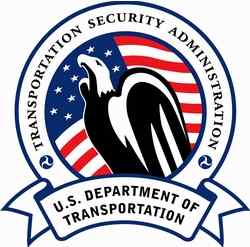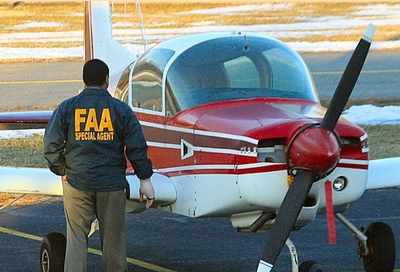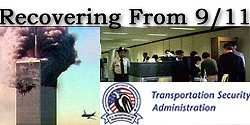Charges TSA In Misusing SSI to Avoid Embarrassment,
Liability
 A former FAA staffer is
charging that the TSA is designating many documents as
Sensitive Security Information (SSI) -- not to protect national
security, but rather to hide negligence, incompetence and potential
liability.
A former FAA staffer is
charging that the TSA is designating many documents as
Sensitive Security Information (SSI) -- not to protect national
security, but rather to hide negligence, incompetence and potential
liability.
That's the word from former FAA Special Agent Brian Sullivan,
who also warned in May 2001 of the risk of multiple hijackings
starting from Boston Logan Airport. Now, he's joined with the
9/11 Families United to Bankrupt Terrorism in urging the U.S.
Senate to enact language in the House DHS Appropriations bill that
would end TSA's abuses and ensure that only truly sensitive
documents are labeled SSI.
"I know from first-hand experience that roughly 95 percent of
the materials that are labeled SSI have no national security value
and should be released to help the American people arm ourselves
against future terrorist attacks," Sullivan said.
"There are only three explanations for why TSA wrongly labels so
much information as SSI," Sullivan explained.
"The first is that TSA is too understaffed or too lazy to go
through each document and redact the one or two paragraphs that are
truly sensitive, so they place the entire piece off limits. The
second is that TSA still has not put in place uniform guidelines,
policies and procedures for making SSI designations. The third is
that TSA is acting to protect the old FAA, the airlines and the
screening companies from legal liability, a possibility that was
brought into sharp relief when TSA attorney Carla Martin's alleged
collusion with aviation industry attorneys was exposed during the
Zacarias Moussaoui trial."

"Brian Sullivan was on the inside of the SSI process and his
testimony and support proves that our mission of revealing the
truth about how and why our loved ones died is not only right, but
in the interest of our national security," said William Doyle of
Staten Island N.Y., whose 25-year-old son Joseph died at the World
Trade Center.
"This man is a truth-teller who warned about 9/11 in advance and
told the FAA how vulnerable security was at Logan Airport," Doyle
said.
 "Anyone who fails to
listen to his view that it will strengthen our security for
Congress to bring TSA under control would be making the same
mistake the FAA did in the spring and summer of 2001."
"Anyone who fails to
listen to his view that it will strengthen our security for
Congress to bring TSA under control would be making the same
mistake the FAA did in the spring and summer of 2001."
Sullivan was special agent and risk management specialist for
the FAA in New England, where he analyzed the security
vulnerabilities of airports and aviation facilities in the region.
He also served as the security control point for New England and,
in this capacity, received and controlled the flow of secret
information, including SSI. Sullivan retired in January 2001.
"It is critical to understand that SSI is not classified
information -- it is a designation for lower-level 'proprietary
information,'" Sullivan said. "Ironically, all classified materials
must be reviewed after a designated period of time to see if they
can be released. Yet the far less sensitive SSI materials are
subject to no such review. All Section 525 of the House DHS
Appropriations Bill would do is apply the same process to SSI --
have the documents reviewed after three years to see if their
release would pose no security threat."
Sullivan cited two specific examples of wrongly-designated SSI
documents. The first was the Checkpoint Operations Guide (COG) in
place on September 11, 2001. "TSA changed its airport checkpoint
procedures," Sullivan asked, "so why did it stubbornly resist the
COG release for four years before finally relenting?"
The second document Sullivan cited was the staff monograph on
aviation security that was part of the 9/11 Commission Report. When
it was first released, TSA blacked out more than 50 percent of the
monograph as SSI.
 Under pressure from the
9/11 families, TSA released another third of the document. Under
further pressure, TSA reduced its redactions to just 2 percent of
the monograph. "When you look at the pages TSA originally blacked
out and finally released, it becomes obvious the only reason this
material was first denied to the public was because it was
embarrassing to the FAA and the airlines," Sullivan said.
Under pressure from the
9/11 families, TSA released another third of the document. Under
further pressure, TSA reduced its redactions to just 2 percent of
the monograph. "When you look at the pages TSA originally blacked
out and finally released, it becomes obvious the only reason this
material was first denied to the public was because it was
embarrassing to the FAA and the airlines," Sullivan said.
"This is inexcusable," he charged. "It was my job to protect
national security secrets and the last thing I would ever want is
for this information to get out. But it is equally offensive to
hide information that is no threat to national security just
because it would invite public scrutiny or subject large
corporations to legal liability. The public has the right to know
so we can protect ourselves in the future. After five years of TSA
intransigence, it's time to make this happen."
The provision Sullivan and the 9/11 Families urge the Senate to
pass, Section 525 of the House DHS Appropriations bill, would
require TSA to:
-
 Release all information
that is more than three years old and not incorporated in a
current, active transportation security directive or plan
unless TSA demonstrates a compelling reason why it would present
a risk of harm to the nation;
Release all information
that is more than three years old and not incorporated in a
current, active transportation security directive or plan
unless TSA demonstrates a compelling reason why it would present
a risk of harm to the nation;
- Standardize and justify its practices for classifying documents
as secret; and
- Turn over documents requested by a judge in a legal proceeding
unless TSA demonstrates a compelling reason why it would
present a risk of harm to the nation.
Language in the DHS Appropriations Bill reported out of the
Senate Appropriations Subcommittee on Homeland Security, would
impose no such requirements, instead giving TSA 120 days to report
to Congress on the progress it has made implementing provisions in
last year's appropriations bill requiring it to fix the SSI
process. "No one needs another 120 days to get the job done,"
Sullivan said. "Congress should hold TSA accountable today!"
The 9/11 Families United to Bankrupt Terrorism represents more
than 6,000 survivors and family members of those who died in the
September 11, 2001, terrorist attacks. The 9/11 Families seek to
hold al Qaeda's financiers accountable for their central role in
these atrocities and to make America safer by cutting off the
financial pipeline fueling global terrorism.
 Aero-News: Quote of the Day (10.23.25)
Aero-News: Quote of the Day (10.23.25) ANN's Daily Aero-Linx (10.23.25)
ANN's Daily Aero-Linx (10.23.25) ANN FAQ: Turn On Post Notifications
ANN FAQ: Turn On Post Notifications Classic Aero-TV: Kitfox Upgrades Back-Country Undercarriage
Classic Aero-TV: Kitfox Upgrades Back-Country Undercarriage Airborne-NextGen 10.21.25: NZ Goes Electric, World Cup UAVs, eAviation Shuttered
Airborne-NextGen 10.21.25: NZ Goes Electric, World Cup UAVs, eAviation Shuttered







